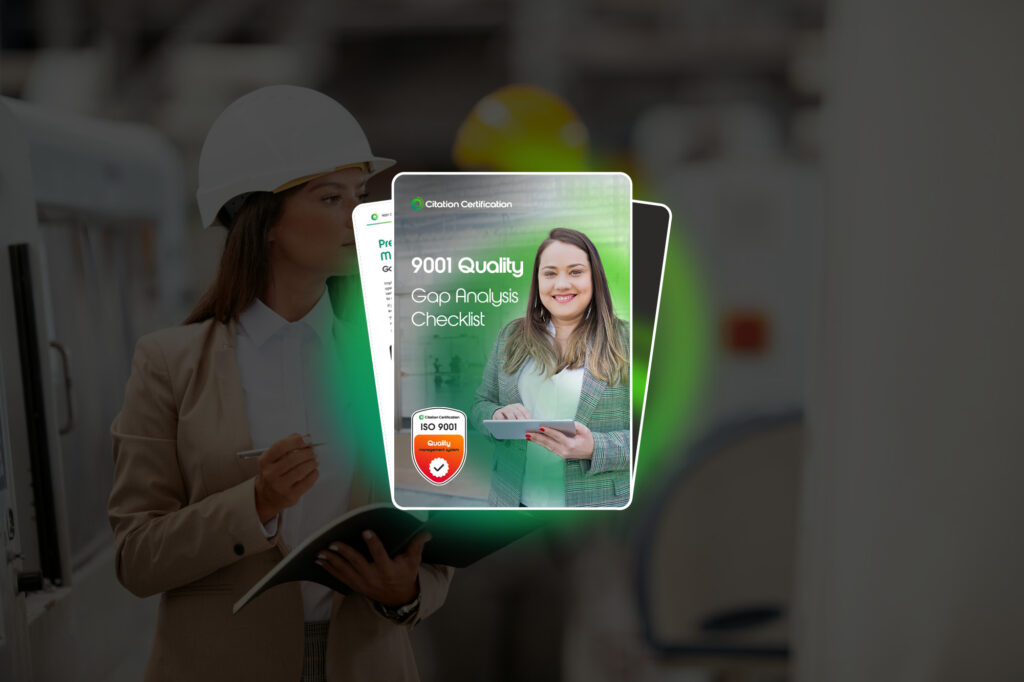

What is ISO 9001?
ISO 9001:2015 Certification is a Quality Management System (QMS), that provides a framework for organisations to streamline their operations, drive continuous improvement and enhance customer satisfaction. Achieving this certification shows your commitment to a process-based approach that boosts your performance evaluation, dedication to excellence and risk-based mindset.
So which industries best suit ISO 9001 certification? In short, businesses across most sectors will benefit from this certification. From local government, architecture, and construction and manufacturing to telecommunications, software development and plumbing – we’ve worked with thousands of businesses across many different sectors.
The benefits of ISO 9001 Certification
Your journey to obtaining ISO 9001
Ready to begin your ISO 9001 certification process? The friendly team at Citation Certification make this journey smooth and seamless. We’re by your side every step of the way, arming you with the correct resources and taking the time to walk you through the standards.

Why Citation Certification?
Citation Certification brings over 30 years of experience through the merging of Best Practice Certification and QMS Certification Services – two of New Zealand’s most respected accredited certification bodies. This proven track record in JAS-ANZ accredited certification services sets up Citation Certification to be your trusted partner on the road to ISO 9001 certification.
Maintaining a simple and effective approach, our continued commitment to business excellence and in-depth understanding of management system standards sets us apart from the rest.
We work with businesses of all sizes and industries to achieve their strategic goals – think of us as your Business Pit Crew – we’re there for you at the ready to support you on your journey to success. And we’re all about making the whole process simple and hassle-free.

The Citation Certification difference
- Feel at ease – our team is personable, friendly, local, and supportive.
- Have a question? Need guidance? Clients can access our expertise whenever they need it.
- Dedicated to delivering high-quality customer care.
- Access eight complimentary online courses to help you prepare for your audit.
- Citation Certification is part of the Citation Group. Access additional workplace compliance resources to support your business.

Prepare your ISO 9001 management system
If you are implementing an ISO 9001 Quality Management System (QMS) in your organisation and you’re preparing for an external audit, our ISO 9001 Gap Analysis Checklist will give you the list of items you need to prepare.
The first step in implementing an ISO management system in your organisation is to identify the gaps by comparing your current management systems with the ISO 9001:2015 requirements.
Citation Certification are friendly, helpful and offer great advice. Completing ISO audits is an opportunity to learn and fine tune our processes and policy. They facilitate a really open and safe environment which makes it less stressful and even enjoyable!
Access our latest news and insights
Got burning questions? We’ve got answers.
ISO 9001 certification is a formal acknowledgment that an organisation’s quality management system (QMS) complies with the ISO 9001 standard, ensuring consistent quality. It demonstrates a commitment to quality management principles, enhances customer satisfaction, and provides a structured framework for continual improvement.
There are four key steps for achieving ISO 9001 certification, ensuring comprehensive compliance with quality management standards.
- Gap analysis: evaluate the organisation’s processes in relation to ISO 9001 requirements, identifying areas for quality improvement and ongoing improvement.
- Stage one: assess the management system documentation, including policies, quality tools, and documented information to meet customer and regulatory requirements.
- Stage two: conduct an on-site certification audit to ensure alignment with quality management principles and robust quality control processes.
- Certification: once compliance is validated, the certification body will issue a statement of ISO 9001 compliance that remains valid for three years with regular audits to sustain certification.
If you have any enquiries or want to learn more about the certification procedure, get in contact with us.
The latest version is ISO 9001:2015, which introduces quality management principles designed to meet customer expectations and adapt to modern business needs. It emphasises a structured framework for continuous improvement, risk management, and streamlining operations to boost service delivery and product quality. ISO 9001:2015, has replaced ISO 9001:2008.
The cost of evaluating your management system in accordance with ISO 9001:2015 requirements can differ.
The certification market is strictly regulated. Before we can provide you with a quote, we need to understand the size of the organisation, its work practices, locations, and the scope of the management system.
We offer transparent, all-inclusive pricing. There are no hidden reporting or preparation fees.
Before you can be certified, your system has to fulfil the necessary requirements. The steps for developing your quality management system for certification are described here.
- By reading the ISO 9001 standard and becoming familiar with the terminology, you can easily understand the intent.
- Recognise the criteria outlined in the standard. Develop your management system in accordance with the standards.
- To determine your level of certification readiness, conduct a gap analysis. Any areas that require additional development will be identified from this.
- Assess your management system internally. After your management system has been developed, you must conduct an internal audit to make sure you are following the standard and remain compliant. You should take advantage of this chance to make sure you are prepared for the certification audit.
- Go through the certification process. A QMS audit will be required to evaluate your company’s compliance with ISO 9001:2015.
ISO 9001 is necessary to demonstrate to stakeholders, suppliers, and clients that you have a quality management system that can meet their exacting expectations, particularly during things like tender processes.
Companies must be evaluated against the standard and undergo ongoing surveillance audits in order to become certified. This guarantees ongoing compliance, makes plans for corrective action, offers feedback on how they can continually improve their operations, and makes sure they are meeting customer requirements.
The requirement for certification is outlined in the ISO 9001:2015 standard. The clauses that make up these requirements give your management system its framework. By satisfying these requirements, you demonstrate to the certification body that your operations uphold high standards for customer satisfaction and the quality of your goods and services, as well as the international standard governing quality management.
The clauses are Context of the Organisation (clause 4), Leadership (clause 5), Planning & Addressing Risks and Opportunities (clause 6), Support (clause 7), Operation (clause 8), Performance Evaluation (clause 9) and Improvement (clause 10).
The new ISO standard structure, Annex SL, is adhered to by ISO 9001:2015, enabling seamless integration with current global standards like ISO 14001, ISO 45001, or ISO 27001.
ISO 9001 will benefit your company by streamlining procedures, increasing effectiveness, and boosting customer satisfaction. It offers an organised approach to quality management that boosts your company’s competitiveness and reputation.
- Global recognition: Of the ISO 9000 family of standards, ISO 9001 is the standard that has received the most international recognition for quality management.
- Competitive edge: It provides tactics that foster competitiveness and improve customer satisfaction.
- Universal applicability: ISO 9001 is applicable to businesses of all sizes and in a wide range of sectors.
- Customer satisfaction: Obtaining ISO 9001 certification demonstrates your dedication to improving customer satisfaction and overall product/service quality.
- Demonstrated excellence: Receiving ISO 9001 certification demonstrates your commitment to high standards of quality, client satisfaction, and efficient management techniques.
You can use ISO 9001 training to comprehend the fundamental purpose of the standard and create a quality management system that can be audited in accordance with ISO 9001:2015.
Our live ‘Introduction to ISO 9001’ training course provides the tools to understand quality management standards, explains how to implement a quality system effectively, and how to prepare for certification audits. It includes guidance on internal audits, regular audits, and how to develop a management philosophy focused on service delivery, consistent quality, and customer requirements. Visit our training page to learn more.
When you receive ISO 9001 certification, it lasts for three years after it has been approved. Regular audits, also referred to as surveillance audits, are required to maintain this ISO certification and keep it valid. Only IAF (International Accreditation Forum) certifications are affected by this.
Your ISO certification can be seamlessly transferred to Citation Certification. We’ll keep up to date with your current certification schedule; get in touch with us for a cost estimate without commitment.
Essentially, ISO certification is a written assurance that a particular product, process, system, or even a person meets the requirements of ISO. This assurance is given by a Conformity Assessment Body (CAB) that are accredited by JAS-ANZ.
Citation Certification, formally known as Best Practice and QMS Certification Services, is accredited by the JAS-ANZ accreditation body and is proud to offer Certification to the ISO 9001 Quality Management System (QMS) via site-based or digital audits to streamline the certification process.
ISO 9001 promotes identifying areas of risk and opportunity to ensure robust quality control processes. Risk management and ongoing improvement are integral to reducing potential disruptions, meeting customer expectations, and maintaining environmental impact standards.
ISO 9001 applies universally, from small businesses to large corporations. It’s common across sectors like manufacturing, construction, and IT – but any business can implement certification. Its structured framework ensures continual improvement and helps businesses align with consumer expectations, quality policies, and regulatory requirements.
Triple certification refers to the simultaneous certification of an organisation to ISO 9001 (quality management), ISO 14001 (environmental management), and ISO 45001 (health and safety standards). This demonstrates a commitment to comprehensive management standards and enhances the organisation’s reputation while addressing other stakeholders’ needs.
By implementing processes that continuously improve quality, implementing processes that reduce waste, and demonstrating a strong commitment to high-quality products, quality system certification enables businesses to stay competitive in both local and global markets.












